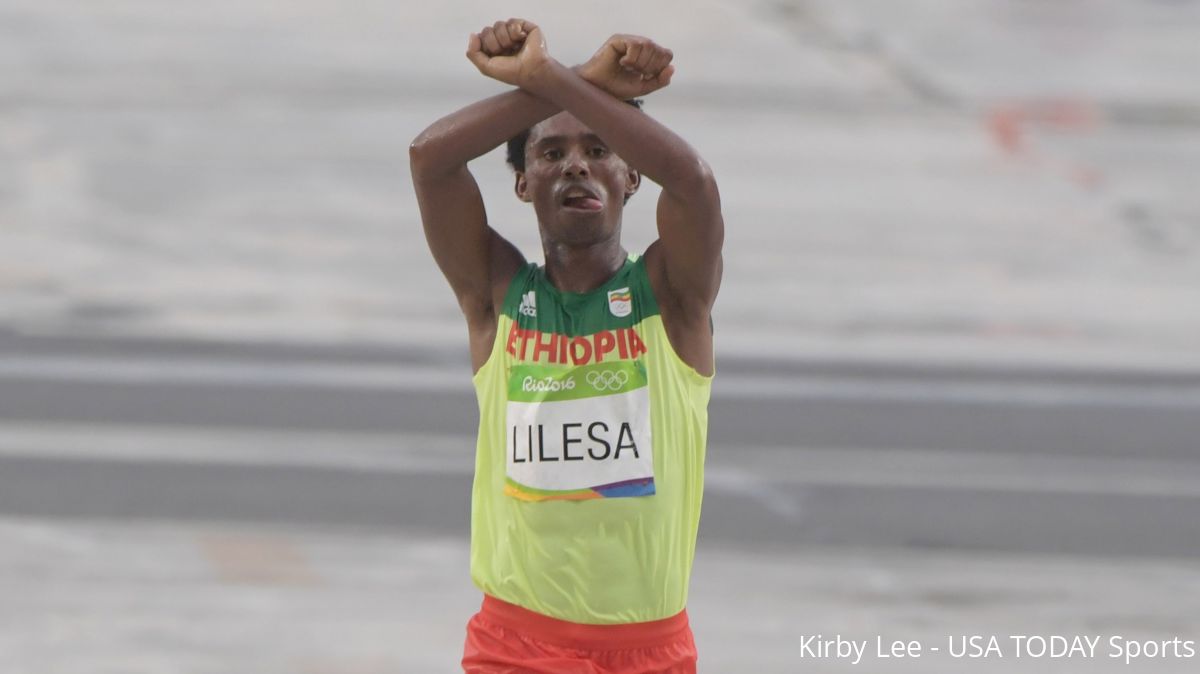Feyisa Lilesa Is In America And Still Fighting
Feyisa Lilesa Is In America And Still Fighting
Less than a month after protesting the Ethiopian government while crossing the finish line of the Olympic marathon, silver medalist Feyisa Lilesa is in the

Less than a month after protesting the Ethiopian government while crossing the finish line of the Olympic marathon, silver medalist Feyisa Lilesa is in the United States and writing about it in the Washington Post. Lilesa initially stayed in Rio and did not return to his home country out of fear that his public anti-government gesture would get him killed.
"I am now separated from my dear mother, my supportive wife and my precious children in Ethiopia, whom I miss dearly," Lilesa wrote. He made no mention of their safety, but said, "Ethiopia's government spokesperson made a comment in the media that I would be safe. But government security forces have killed hundreds for just doing what I did."
He is apparently in the United States on a special skills visa.
Now, it's clear that Lilesa's crossed-wrists gesture at the finish line was not spontaneous, but just the bravest part yet of his activism.
"While training for the Olympics, I feared for my security, because of some philanthropic work I was doing to help young Oromo students who I knew had no opportunities. I was afraid that someone could even jump out from the bushes and take my life while I was out running alone. I have not had a day when I could put my mind and body in sync to focus entirely on my training."
Ethiopia claimed Lilesa would receive a "heroic welcome" if he returned. But Lilesa rejects the idea of returning, and said he was never contacted by Ethiopia.
"I have no plans to initiate contact with the Ethiopian government, and no one from the government has reached out to me. If the government desires to have contact with me, it should free all political prisoners."
He ended his piece with a cogent analysis of the relationship between Ethiopia and the United States, and wrote that American influence would be the only thing that could get the Ethiopian government to stop attacking its protesters.
"I don't think that the United States wants Ethiopia to disintegrate. I am asking the U.S. government to demand an explanation from Ethiopia and to condemn the brutal and unfair actions of the government. The United States needs to push hard for democracy in Ethiopia. I think that is the only thing that will keep my country together."
Left unsaid, though strongly implied, is that the U.S. is enabling the Ethiopian government. But giving a visa to Lilesa--possibly the most famous dissident to date--could be a sign that that is slowly changing.
"I am now separated from my dear mother, my supportive wife and my precious children in Ethiopia, whom I miss dearly," Lilesa wrote. He made no mention of their safety, but said, "Ethiopia's government spokesperson made a comment in the media that I would be safe. But government security forces have killed hundreds for just doing what I did."
He is apparently in the United States on a special skills visa.
Now, it's clear that Lilesa's crossed-wrists gesture at the finish line was not spontaneous, but just the bravest part yet of his activism.
"While training for the Olympics, I feared for my security, because of some philanthropic work I was doing to help young Oromo students who I knew had no opportunities. I was afraid that someone could even jump out from the bushes and take my life while I was out running alone. I have not had a day when I could put my mind and body in sync to focus entirely on my training."
Ethiopia claimed Lilesa would receive a "heroic welcome" if he returned. But Lilesa rejects the idea of returning, and said he was never contacted by Ethiopia.
"I have no plans to initiate contact with the Ethiopian government, and no one from the government has reached out to me. If the government desires to have contact with me, it should free all political prisoners."
He ended his piece with a cogent analysis of the relationship between Ethiopia and the United States, and wrote that American influence would be the only thing that could get the Ethiopian government to stop attacking its protesters.
"I don't think that the United States wants Ethiopia to disintegrate. I am asking the U.S. government to demand an explanation from Ethiopia and to condemn the brutal and unfair actions of the government. The United States needs to push hard for democracy in Ethiopia. I think that is the only thing that will keep my country together."
Left unsaid, though strongly implied, is that the U.S. is enabling the Ethiopian government. But giving a visa to Lilesa--possibly the most famous dissident to date--could be a sign that that is slowly changing.